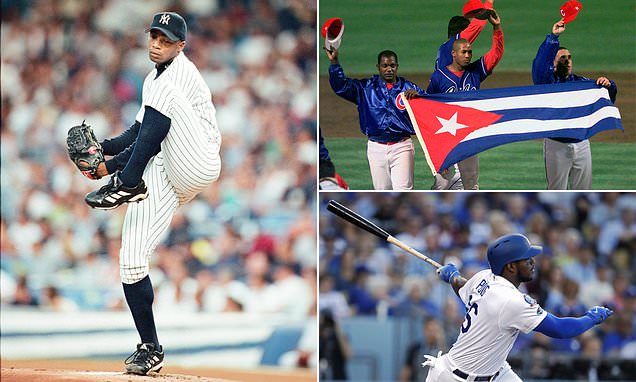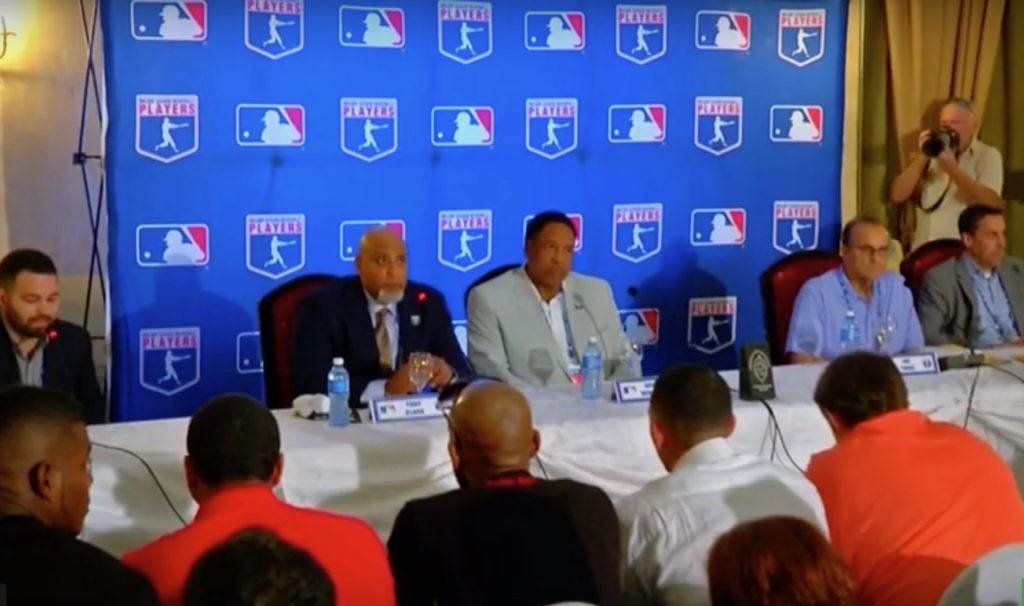
Baseball deal nixed by Trumpians; yet, Cubans still the bad guys
The year was 1999. It was December and I was in Havana visiting family members. We would celebrate the New Year. During a party at a friend’s apartment a friendly conversation with a Cuban government official present that day turned to the subject of Orlando ‘El Duque’ Hernández. El Duque, as he was known by most everyone, had just finished his best year in baseball’s major leagues. He’d won 17 games and had helped lead the New York Yankees to the World Series where they’d swept a very good Atlanta Braves team 4 – 0. In the American League Championship Series, the last step to the World Series, Hernández had been named Most Valuable Player.
It had been a magical season. Especially if you’re a Yankees fan like I am, having grown up with an early morning dash to grab the morning newspaper to check out how Mickey Mantle and my beloved Yanks had done the previous day. That was the 1960s and no one had even an inkling that one day we’d have Internet and Twitter and Facebook and ESPN and all this media that transmits news to us —practically instantly. But I deviate from the issue.
Let me get back to Havana. 1999. The conversation turned to El Duque because two years earlier, on Christmas Day, Hernández had defected from Cuba. The reason for his defection were many, which included his brother Livan, who had become famous himself pitching for the Florida Marlins, and leading them to World Series glory.
At first, the Cuban official — although recognizing Hernandez’ baseball greatness and admitting to being a fan and taking pride in his accomplishments — was critical of the fact that El Duque had left Cuba. Putting aside the many good reasons he had for leaving, I set forth an argument defending any Cuban baseball player considered great on the Island challenging himself and wanting to play against the best in the world on the sports’ biggest stage. That is what sports are all about, I explained. That millions of dollars were involved was also an important factor, I added.
Like I said at the time, a Cuban athlete getting paid millions of dollars represented money that would surely help him improve his lifestyle, but it also meant money for a family that needed it. And if all things had been normal, it would also have represented tax dollars coming into the country’s coffers. Money that would help all Cubans on the Island. It was a winning formula for all.
We never came to a real agreement on the matter, but the person’s attitude told me she agreed with me on principal when it came to this issue.
 Fast forward to 2019, not quite 20 years from that conversation, and I am proud and glad to say that Cuba has evolved. Last December the Cuban Baseball Federation and Major League Baseball (MLB) agreed on a deal that would ease “the path for players to compete in the United States without defecting from their country.” It was a breakthrough in a tenuous relationship that had existed for years.
Fast forward to 2019, not quite 20 years from that conversation, and I am proud and glad to say that Cuba has evolved. Last December the Cuban Baseball Federation and Major League Baseball (MLB) agreed on a deal that would ease “the path for players to compete in the United States without defecting from their country.” It was a breakthrough in a tenuous relationship that had existed for years.
As reported by The New York Times, “M.L.B. and its players union sought to eliminate that dangerous process [defection] by creating a posting system similar to the one used with players from Japan and South Korea. Under the plan, a major league team seeking to sign a Cuban player would pay a posting fee to the Cuban federation, which would in turn allow the player to leave the country and return home at will.”
But the Trump administration last week nixed the deal.
“The Treasury Department told MLB attorneys in a letter Friday that it was reversing an Obama administration decision allowing the major leagues to pay the Cuban Baseball Federation…” according to a report in The Washington Post.
The Post report explains that “without a formal path from Cuba to the major leagues, hundreds of top players have left the island for good, many making harrowing crossings on rafts and rickety boats in the years before Cuba abandoned a hated exit permit requirement for most of its citizens.
“While such dangerous escapes were mostly eliminated with greater travel freedoms, players still needed to cut ties with Cuban baseball and often their families and hometowns, going years without returning after signing with the major leagues.”
Who is behind this? Same names you will always hear when it comes to doing harm to both Cuba, and in the end the U.S. itself. There’s also a baffling quote in The New York Times by National Security Adviser John Bolton, he of the way too shaggy mustache that went out with Nixon and the ever present scowl, who said: “Cuba wants to use baseball players as economic pawns — selling their rights to Major League Baseball. America’s national pastime should not enable the Cuban regime’s support for Maduro in Venezuela.”
Which leads me to ask: What does Maduro and Venezuela have to do with Cuban baseball, the Major Leagues, and this agreement?
As I said, Cuba has evolved. But with Trump, Bolton, Rubio et al, and the U.S. have devolved…
But let us not forget, the Cubans are the bad guys. Always.

